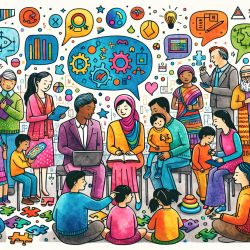Introduction
The world of eHealth is rapidly evolving, offering new opportunities for healthcare practitioners to enhance the delivery of psychoeducational programs. The research paper titled Type 1 Diabetes eHealth Psychoeducation: Youth Recruitment, Participation, and Satisfaction provides valuable insights into the effectiveness of online interventions for youth with Type 1 diabetes. This blog post aims to help practitioners improve their skills by implementing the outcomes of this research or encouraging further exploration.
Key Findings from the Research
The study analyzed the recruitment, participation, and satisfaction of youth with Type 1 diabetes in two eHealth psychoeducational programs. Here are some key findings:
- Recruitment Challenges: Black, Hispanic, or mixed-race youth and those from low-income families were less likely to enroll in eHealth programs compared to white and higher-income youth.
- Participation Rates: Participation was high overall, with 78.1% of youth completing at least four out of five sessions. However, low-income youth were less likely to participate, possibly due to access issues.
- Satisfaction Levels: Satisfaction was high across the board, with significant differences observed based on gender, race/ethnicity, and income. Girls, black, Hispanic, or mixed-race youth, and low-income youth reported higher satisfaction.
Implications for Practitioners
These findings highlight several areas where practitioners can focus their efforts to improve outcomes for youth with Type 1 diabetes:
- Creative Recruitment Strategies: Develop innovative recruitment approaches to engage diverse populations, particularly black, Hispanic, or mixed-race youth and those from low-income families.
- Enhance Accessibility: Address barriers to participation by ensuring that eHealth programs are accessible to all youth, regardless of socioeconomic status. Consider offering programs in schools or community centers where internet access may be more reliable.
- Culturally Relevant Content: Incorporate culturally diverse characters and scenarios in program content to increase engagement and satisfaction among diverse youth populations.
Encouraging Further Research
The study underscores the need for continued research into the recruitment, participation, and satisfaction of diverse youth populations in eHealth programs. Practitioners are encouraged to explore the following areas:
- Longitudinal Studies: Conduct long-term studies to assess the sustained impact of eHealth interventions on diabetes management and psychosocial outcomes.
- Platform Diversity: Investigate the effectiveness of delivering eHealth content through various platforms, such as smartphones, to reach a broader audience.
- Parental Involvement: Examine the role of parental support and involvement in enhancing youth engagement and outcomes in eHealth programs.
Conclusion
eHealth programs hold great promise for improving the lives of youth with Type 1 diabetes. By leveraging the insights from this research, practitioners can enhance their practice and contribute to better health outcomes for diverse youth populations. To read the original research paper, please follow this link: Type 1 Diabetes eHealth Psychoeducation: Youth Recruitment, Participation, and Satisfaction.










